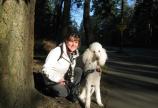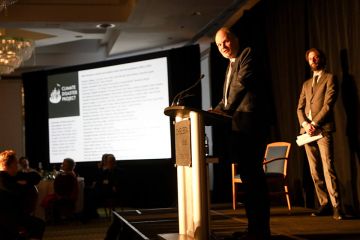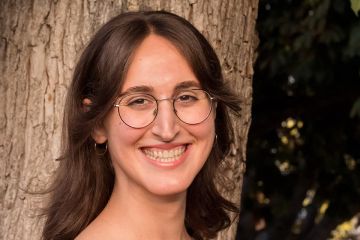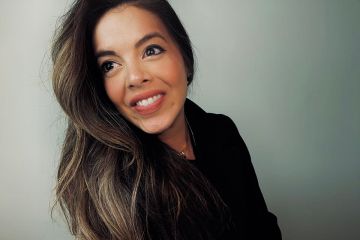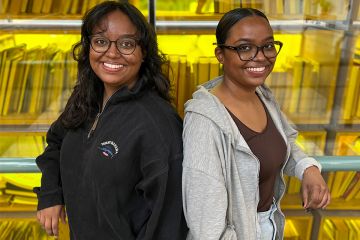Writing grad sees beyond perceptions of limitations
- John Threlfall
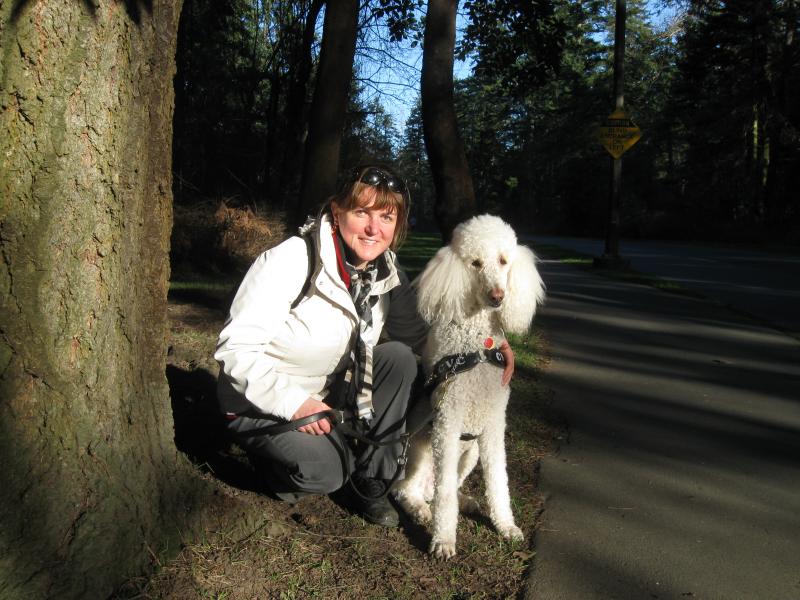
As an MFA candidate in the Department of Writing, Hannalora Leavitt has spent the past two years fulfilling the same kind of duties and responsibilities as most UVic graduate students: conceiving a thesis, working with a supervisor, giving lectures, teaching classes, marking papers, reading, writing, research. But given her specialty in creative nonfiction, Leavitt is also tasked with interpreting the world as she sees it—no easy job when you’re a blind writer.
After losing most of her vision from a brain tumour at age 10, the 55-year-old Leavitt now sees the world in more conceptual terms: blindness is not a challenge to be conquered but the space she inhabits—which, for a writer, can create unique opportunities. “People say, ‘We don’t know what your characters look like’—but neither do I,” she chuckles. “I haven’t seen details of my environment and people for so long, I don’t reflect them in my writing.”
By its very definition, creative nonfiction is inevitably as much about the writer as the subject, and necessitates the skills of both chronicler and bard. “I’ve always been a storyteller,” says Leavitt, who arrived at UVic with a stack of published newspaper and magazine profiles behind her. Yet after beginning an English undergrad, she soon transferred into Writing. “Nonfiction with a creative element, that’s what I was looking for. I can’t make up anything better than the truth.”
Leavitt’s MFA thesis, In Plain Sight, is a blend of both her own experiences and a look at society’s relationship with blind people. “The blindness I’ve figured out how to live with, but the attitudes about it are where I always stumble: how did I instinctively know to be ashamed of it? How did I, even as a young kid, know blind people lived in the margins?” And while her historical discoveries have been fascinating—ranging from Industrial Revolution-spawned syphilis and both world wars to 1950s “incubator babies” and contemporary macular degeneration—Leavitt’s biggest hurdle has been the same as any other writer: herself. “It’s been a huge emotional challenge,” she admits. “I like telling other people’s stories, not my own.”
Realizing that being identified as “a blind writer” could be both a niche and trap, Leavitt didn’t just want to write about growing up without sight. “There are already a lot of memoirs out there about that. I don’t try to write straightforward ‘how to be a successful blind person’ stuff because I don’t think it’s all that interesting. I’d rather make people think a bit more about it.”
Leavitt credits both her MFA supervisor, Dr. Lynne Van Luven, and UVic’s Resource Centre for Students with a Disability as being “pivotal” to her academic success. Pointing out how the basic mechanics of research—reading, writing and editing—held her back as an undergrad, Leavitt now has a research assistant and screen-reading software on her computer . . . which, while essential, can also be downright annoying. “I’ve read a lot of material with Stephen Hawking’s voice echoing in my mind,” she laughs. “Dealing with that repetitive monotone synthetic speech all the time is a whole other level of challenge.”
Ultimately, Leavitt has no desire to be framed as any kind of leader or champion; like any other writer, she’d rather be known for her words. “We all can’t be superheroes,” she says. “Some of us are just normal, everyday people with plenty of challenges that nobody ever sees.”
Photos
In this story
Keywords: writing, disability
People: Hannalora Leavitt, Lynne Van Luven

